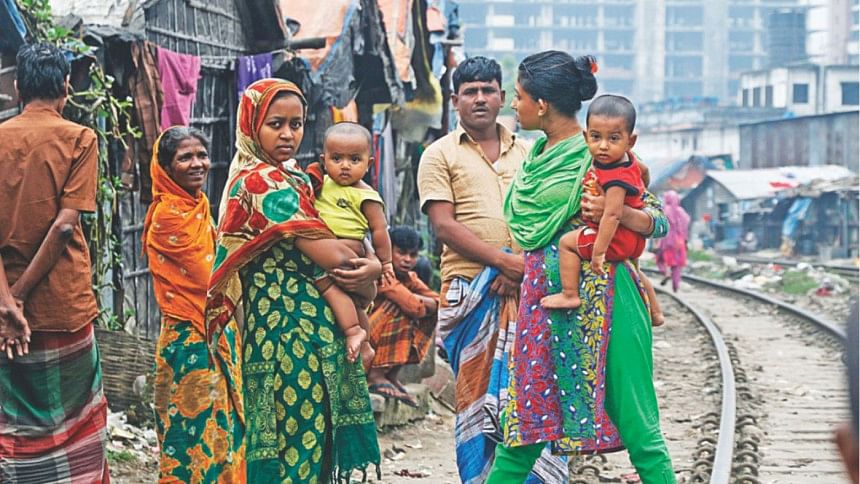The Story of a Girl Child

There's usually a festive atmosphere in a household before a baby is born, with family members gathering and cheering in anticipation of the arrival of the new member of the clan, with sweets and whatnot at the ready. However, that laughter and happiness often fade when it transpires that the baby is a girl. The tragedy of her life begins with her first breath.
Let us imagine the journey of this girl child in our society against the backdrop of our sociocultural reality. As it is the month of Falgun now, let us call her, this hypothetical child, by that name. While Falgun may not be a real person, her experiences are shared by many. Falgun, like many other infants, is born underweight and premature, as one-fifth of the babies born in Bangladesh are. The neonatal mortality rate is 19.1 deaths per 1000 births in Bangladesh, while the Bangladesh Maternal Mortality and Health Care Survey 2016 estimated 196 maternal deaths per 100,000 births.
Unfortunately, Falgun is not one of the 50 percent of births who were attended by medically trained personnel (in 2016). Right off the bat, her options and opportunities are limited. In most cases, mothers face post-partum complications like bleeding (haemorrhage) or eclampsia, accounting for 55 percent of all maternal deaths in Bangladesh. About 14 pregnant mothers die every day while giving birth in the country due to different complications. These obstetric complications can be treated if there is Emergency Obstetric Care near the household. Falgun's mother had to be taken to the hospital due to complications and she missed colostrum, the first vaccine in a child's life attained through breastfeeding. However, this little baby is blamed for the sufferings of her mother.
Falgun is growing. Soon she notices the difference between herself and her older brother who can play, eat, travel, etc. freely. On the other hand, she is restricted inside the home, and has already been assigned small domestic chores. However, as she starts going to the school, the difference between boys and girls gets even starker.
As she approaches her teens, one midnight she has her first menstruation. It scares her, having never experienced the phenomenon before. Later, she ceases going to school during periods. Up to one in four girls reported that they miss school during menstruation due to superstition and lack of adequate facilities.
As Falgun progresses further into her adolescence, things get worse. Her dark complexion makes people look down upon her. She is seen as a lesser being, although this does not stop the boys in the neighbourhood from catcalling her, making lewd remarks, and trying to get her attention when she is out and minding her own business. Falgun learns to ignore it—maybe it is part of growing up, she thinks, something that happens to every girl and that nothing can be done about it. Bangladesh National Women Lawyers' Association showed that almost 81 percent of girls aged 10-18 experienced some form of catcalling or harassment in 2018. Ain o Salish Kendra (ASK) reported more than 975 cases of rape and sexual assault in Bangladesh in 2020. These are just the ones that have been reported—a fraction of the actual number.
To "save" her from "anything untoward" happening to her, Falgun's parents then decide to get her married and put her "under the protection" of a man twice her age. At 16, Falgun has no idea what to expect or what marriage entails, but she is married off anyway, with no thought given to her opinion on the matter. The rate of child marriage in Bangladesh is the highest in South Asia, at 59 percent, and is ranked fourth globally (UNFPA 2019).
Bangladesh also has had the dubious "honour" of having the third highest number of adolescent mothers in the sub-continent in the last few years, and Falgun is one of these victims. The use of modern contraceptives among married teenage girls (15-19) is 47 percent, compared to the national average of 64 percent. She does not remember the faces her community made when she was born, but she is quite aware of what her child will have to face if she too is a girl.
Falgun's father, a day-labourer, had to borrow Tk 100,000 and put out a mortgage on the house to afford the dowry. The husband abuses her continually, reprimanding her for being a "burden" and not contributing enough to the household. Meanwhile, he does not allow her to work. A research paper titled "Spotlight on Violence Against Women in Bangladesh: Trends and Solution" mentioned that 66 percent of women in the country have been victims of domestic violence, and 72.7 percent of them never disclosed their experience to others. Falgun has neither the courage nor the knowledge nor even the awareness of her rights to seek justice. Only 2.6 percent of women take legal action against physical or sexual violence committed by their partners in Bangladesh (National VAWG Survey 2015).
Falgun finally decides that she has had enough, and leaves her husband's house to save herself and her daughter from constant physical abuse. She moves abroad to seek work and try to repay her father's loan that she felt she was responsible for. Instead, she becomes a stranger in a strange land, exploited and mistreated. Her vision of living abroad was vastly inaccurate, and after 2.5 years, she returns to Bangladesh, and alive. The Daily Star reports that between 2016 and September of 2020, the bodies of 437 female migrant workers had arrived in the country.
Afterwards, she starts living in an urban slum with her daughter and works at a garment factory, leaving her daughter with the neighbours. But every minute, she worries about her child. Not just whether she has eaten or rested properly, but also about her safety. These concerns are all too real to her, given her own daily experience. Even in the workplace, her male colleagues or supervisors hardly appreciate her work, asking instead about her personal life and sometimes requesting for personal time. She noticed that all girls or women, irrespective of age, status and complexion, faced the same humiliation.
She works overtime late into night and with little extra pay, risking harm on the dark lonely roads back home. One of these late nights, as she is returning home, she is confronted by misogynistic comments from a group of men on the street. For some reason, that night, Falgun does not walk away, afraid of her tormentors, as she would on previous occasions. She confronts them and yells back and gives them a piece of her mind. It takes extreme courage and determination for her to do what she does, confronting patriarchy head-on.
Falgun is the archetypical everywoman in our society. There are vast numbers of women whose story would match that of Falgun, who grow up and old as lesser beings. The truth of the matter is, these women and girls have every right to live a healthy and dignified life—a life on their own terms—and we need to do more to remove the obstacles that are put in their way.
Kazi Amdadul Hoque is Senior Director, Friendship.
Email: [email protected]

 For all latest news, follow The Daily Star's Google News channel.
For all latest news, follow The Daily Star's Google News channel. 



Comments